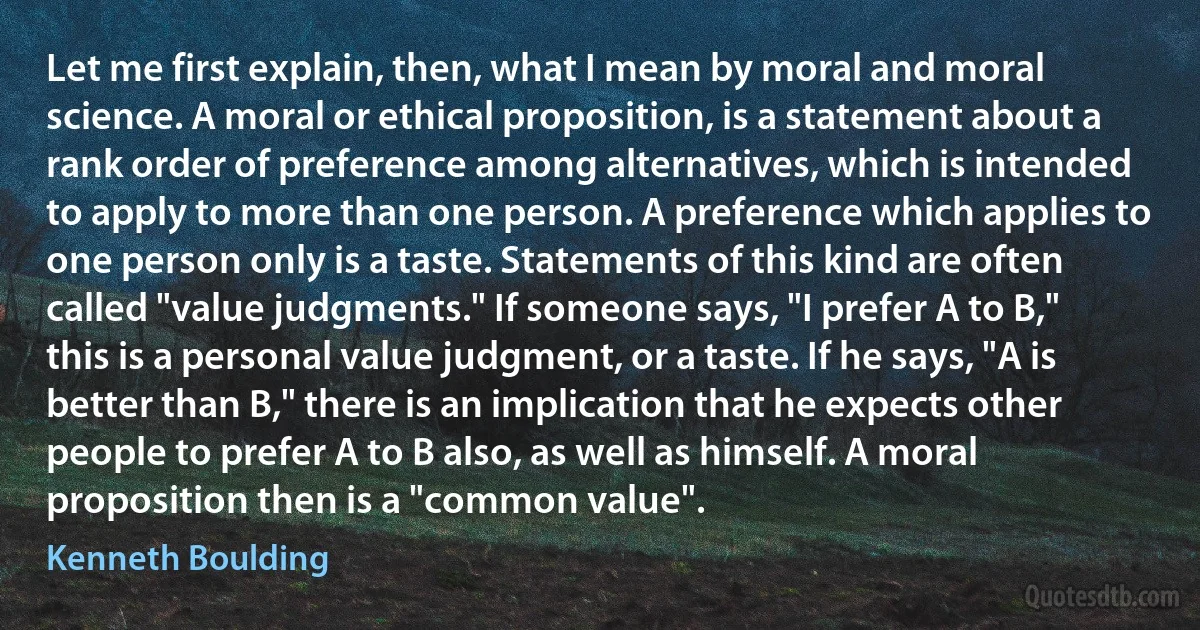
Let me first explain, then, what I mean by moral and moral science. A moral or ethical proposition, is a statement about a rank order of preference among alternatives, which is intended to apply to more than one person. A preference which applies to one person only is a taste. Statements of this kind are often called "value judgments." If someone says, "I prefer A to B," this is a personal value judgment, or a taste. If he says, "A is better than B," there is an implication that he expects other people to prefer A to B also, as well as himself. A moral proposition then is a "common value".
Kenneth BouldingRelated topics
common ethical implication judgment kind mean order people person science taste value well someoneRelated quotes
There is beauty as well as danger when you deal with the subtle realms. The beauty is that you can have realizations, revelations, and experiences that can carry over into the waking state. The danger is that you can expose yourself to negative influences. There are many positive as well as negative entities that infiltrate one's consciousness while dreaming or disturb one during astral travel. Often they appear in the form of family members or close friends. There are also beings on the subtle plane that are in the habit of engaging the sleeping person in unwanted sexual activity.

Bhakti Tirtha Swami
It is India that gave us the ingenious method of expressing all numbers by means of ten symbols, each symbol receiving a value of position as well as an absolute value; a profound and important idea which appears so simple to us now that we ignore its true merit. But its very simplicity and the great ease which it has lent to computations put our arithmetic in the first rank of useful inventions; and we shall appreciate the grandeur of the achievement the more when we remember that it escaped the genius of Archimedes and Apollonius, two of the greatest men produced by antiquity.

Pierre-Simon Laplace
Faculty Psychology is getting to be respectable again after centuries of hanging around with phrenologists and other dubious types. By faculty psychology I mean, roughly, the view that many fundamentally different kinds of psychological mechanisms must be postulated in order to explain the facts of mental life. Faculty psychology takes seriously the apparent heterogeneity of the mental and is impressed by such prima facie differences as between, say, sensation and perception, volition and cognition, learning and remembering, or language and thought.

Jerry Fodor
The method of successive approximations is often applied to proving existence of solutions to various classes of functional equations; moreover, the proof of convergence of these approximations leans on the fact that the equation under study may be majorised by another equation of a simple kind. Similar proofs may be encountered in the theory of infinitely many simultaneous linear equations and in the theory of integral and differential equations. Consideration of semiordered spaces and operations between them enables us to easily develop a complete theory of such functional equations in abstract form.

Leonid Kantorovich
The mathematical thermology created by Fourier may tempt us to hope that, as he has estimated the temperature of the space in which we move, me may in time ascertain the mean temperature of the heavenly bodies: but I regard this order of facts as for ever excluded from our recognition. We can never learn their internal constitution, nor, in regard to some of them, how heat is absorbed by their atmosphere. We may therefore define Astronomy as the science by which we discover the laws of the geometrical and mechanical phenomena presented by the heavenly bodies.

Auguste Comte
